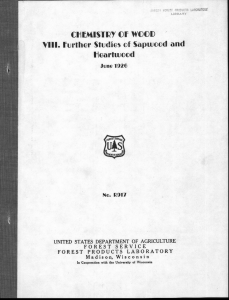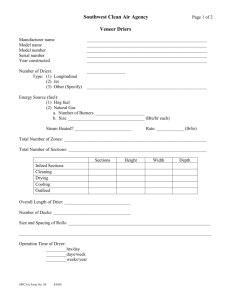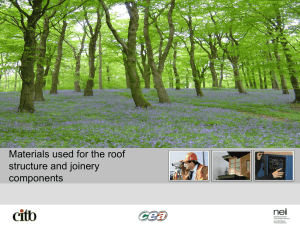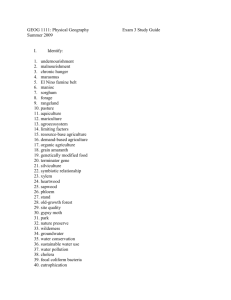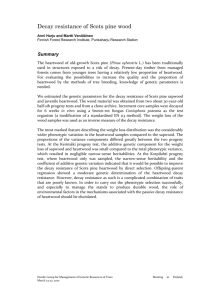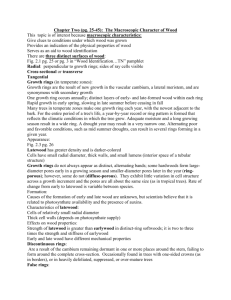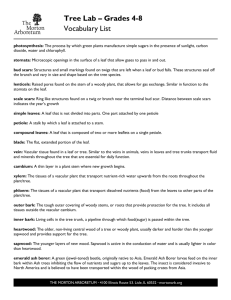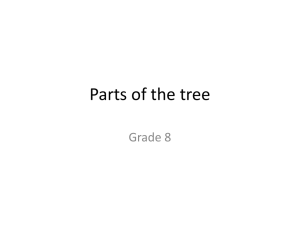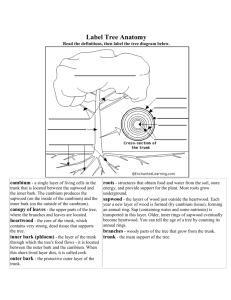CHEMISTRY OF WOOD ' ,
advertisement
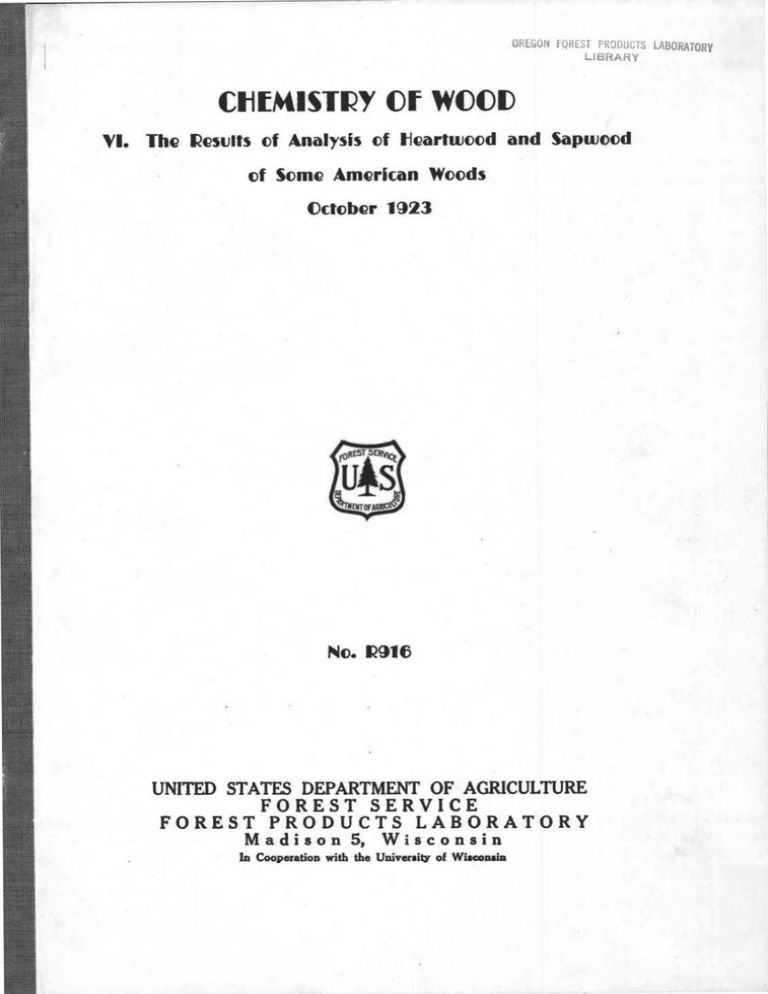
OREGON FQREST PRODUCTS LABORATOR Y
LIBRAR Y
,
VI .
CHEMISTRY OF WOOD '
I.
The Results of Analysis of Heartwood and Sapwoo d
of Some American Wood s
October 1923
UNITED STATES DEPARTMENT OF AGRICULTUR E
FOREST SERVIC E
FOREST PRODUCTS LABORATOR Y
Madison 5, Wisconsi n
In Cooperation with the University of Wisconsin
II
OREGON FOREST ?seescRS LABORATORY
LIBRARY_
,
~r 1
6
alin e.
- _ • a 1'
•-
CMMIuTRY OF WOODl r
- `
▪
•'
i
.
1_ -i
1
_-
_(
-lei
. _'. .' '
1 .1~
-11P .
'J11~
I ~
4.: I
_j
.
By G . J, RITTER, Chemist
FI,,ECK,• Associate Chemist
1
T . z 8 rt t!'r!Y
I
'
II ]
~ ;r1 ,1
I I
This report contains the results obtained in the analysie of hear t ;
wood and sapwood of ten American woods . The work was undertaken to deterieekI
mine whether there is any uniform difference in chemical composition be- . ■e.
tween sapwood and heartwood in elither softwoods or hardwoods ., . .
-. . :y
I
'
LLI I .
The methods of analysis used are the same as ;riven in the preceding
papers in this series .? All determinations were made in duplicate an d
the average is given in Table 1 .
4
er
"t
I. .
Discussion of Results
d
I
I
•
`1f
11
r-yA
I '
-
s_
Ashcontent .--There is no general agreement in the relative ash co
tent of sapwood and heartwood in the species examined .
r
. Extractive content,--In general, the extracts of ether, cold water ,
hot water, and 1 percent sodium hydroxide are lower in the sapwood than i n
the heartwood of the softwoods . In the hardwoods the extractives are lowe r
in the sapwood than in the heartwood of yellow birch, white oak, and yello w
poplar, but the reverse is true of white ash and pignut hickory . Thus ,
from the standpoint of extractive content in sapwood and heartwood, th e
hardwoods analyzed are divided into two classes -- one class following th e
order of the softwood, the other following the reverse course .
Acetic acid .--The acetic acid obtained by hydrolysis is higher i n
the sapwood than in the heartwood of both classes of woods ,
Methoxylcontent .--The relative percentages of methoxyl in the sap wood and heartwood of the species analyzed cannot be arranged in any genera l
order .
-Presented before the Division of Cellulose Chemistry at the 65th meeting o f
the American Chemical Society, New Haven, Conn ., Apr . 2-7, 1923 . Published in Jour . Indus, & Eng . Chem ! , Oct . 1923 .
, 1055 6
-Jour . Indus . & En g . Chem ., Nov, 1922 . 14, 1050 .
:91E
h
1'1 :0 -
-
-
l
Imo'
L_. :
I }
~VI -.- The Results of Analysis of Heartwood
and Sapwood of Some American Woods
II
LI
n. .
1
1
-1
% I J~
Pentosancontent .--There is a tendency toward hi : p er yields o f
pentosans in the sapwood than in the heartwood of the species examined .
The difference in yields, however, is slight .
IIethyl pentosan content .--The methyl pentosan_ content in sapwoo d
and heartwood of the same class is quite uniform .
Cellulosecontent .--For the relative cellulose content of sapwoo d
and heartwood, the species analyzed, with the exception of ;yellow poplar ,
are grouped in a manner similar to that for extractives, All the softwood s
examined have higher cellulose yields in the sapwood than in the heartwoo .
This tends to counterbalance the low extractives in the sapwood . One hardwood group, yellow birch and white oak with high extractives in the heart wood, has high cellulose content in the sapwood . The other group of hard:woods, white ash and pignut hickory with high extractives in the sa p wood ,
has high cellulose content in the heartwood . The results obtained fro m
the two yellow poplar samples, which are en exception to the foregoin g
scheme of grouping, can be explained by referring to the condition of th e
samples .
Both yellow poplar samples showed slight signs of decay in the sac wood, This condition would tend to increase extractives in . the sapwood .
The results show sli g htly higher extractives in the heartwood than in th e
sapwood, which indicates that on the basis of extractives yellow ropier i s
strictly a member of the first group of hardwoods . If it belongs to th e
first group, the cellulose content should be higher in the sapwood than i n
the 'Heartwood, which is not the case . This can also be explained on th e
basis of the decayed condition which decreases the cellulose content i n
the sapwood, the reverse o± what would be expected in sound yellow po?ler .
Lignin content .--In softwoods, with the exce p tion of white ceder ,
the lignin content is higher in the sapwood ;;ha. in the heartwood . In the
hardwoods all species except yellow poplai have a higher lignin content i n
the heartwood than in the sapwoc .c .
J . s budy of the ratio between methoxyl and lignin is shownn in Table P .
A stn- of the results reveal, the fact that the metho .; l-li ;nin ratio i s
approximately 50 percent higher in hardwood ; than in softwoods . Thie r•:-4 o
averages less than 13 percent in bald cypress . In Paper 7 of this series =
it was shown that the metho ,yl content of isolated r.edwocd and live oak
lignins was approximately 17 .5 percent . Bald cypress lignin could not mee t
these specifications and, consequently, it must differ in chemiell composition from redwood and live oak lignir~s .
Pentosan content of cellulcse . e-T'ho p entosan content has a sligh t
tendency to run higher in the sa, .aood cellulose than in the heartwoo d
cellulose, similar to the results obtained in t :_e original wood .
:•.ethyl pentosan content ofcellulose .--In general, the methyl pentosan content is slightly higher in the heartwood cellulose than in the sap wood cellulose . A. similar relation was fe :una in the heartwood and sapwoo d
of the original samples .
R16
-2-
Alpha-, beta-, and amma-cellulose content ofcellulose .- 'he per ,
centages of the three kinds of cellulose in sapwood and heartwood cellulos e
cannot be grouped in any definite arrangement .
Conclusions
From a study of the data given in this report the fallowing conclusions may be drawn :
1, In softwoods the water, ether, and alkali extracts are highe r
in the heartwood than in the sapwood, and as a result the cellulose and
lignin are correspondingly lower in the heartwood (except lignin in white
cedar) .
2 . On the basis of extractives hardwoods are divided-into two
groups : (a) those with high extractives in the . heartwood, and (b) thos e
with high extractives in .the sapwood . The former have high cellulose con tent in the sapwood ; the latter in the heartwood.,
3 . Acetic acid, by hydrolysis is higher in the sapwood t
heartwood of both softwoods and hardwoods .
Lithe
r
-- -
i
t
q
O
M M0000
o 0VO
a 0004M ..MvM
.
.o=4
0)001,0
-c
• ..r+,N
CCe
hIOMNN
OOOIN nNCOn
VC ONCO
MVC
o0 4 0o00 N
..CV N M MNVcV,
'•.1
yy
00
C,
.T•~ .q .0. o
woo .)
r°4
O
0
xi
a+tS q
td
(SCV m
•pq
e0
mCMD .~- . ..1C
74074000N
CCOC074C
OVCOn
CCC
.. .-+ .. ..
MN CO
OW V
v=ov
COCO
ww0N .. NN
C
O0~0
y 44O
001,
CAN000
..
COCO
NM
N NM
MNN
N
uo
o
.41.041410 0401740 v- vvto
O
..VCCO
COCO
MM .,00
10 .0 N,MO.NM
MM
..0001, 000
MN,-I•44
NVC1,W MM ,-,voo
NNO .. .. .. . . r' .. ..
MMr-VC
coo -cm
0001,
ti
-C
'00000
O) MMM0
Cnnoo
NNNN
Nn
.-140
000)000
.Cy
dC01,
.. V .-C ..
()Noma)
0 ..0000
MNmm
NNNN
OO CONo MCN1,
7N MCOCVC
•*000 dC
O CO CO CO CO
0
°
OMC
CA
U
CO m VC m COCoC"
00,-NM
.4 °' 7.0 PI 00
•WCi Mm
O
N ..N ..
14
~' 0 N W
NNNN C+OM .. . .
CO .
COOCOC NC-NW
p
q
000C-OO
41740000
0e
0
d m CCO
C 000O0oCC
p0 ..
--N
..
.. .. . . ...
a
AS
E"OE b
MV
COMCO
m 000
..1
, tC 0
COoomw
0N0M
ON W .
room=
oovo
. .NNN .. .. . .. .. OO
Nv CO
r+ •
nwm .. M•Ci' ..CO hN O)h
NCc 'o 00001, VVt CO ..
CO .-.N O CO MCO 4 1, N m 0
.. . .N N
N N .. N N N
OM000 000v M•M ON CO •
.
Mt-MN
CO CO sM
w comm COCO00n
N1,CO C0 dCh
CO
000000
CO CONC COOC0CCO
oco0CON 000
00 V.CO
w1,
00 .40 .. . .*. .. NN NN
.• .
00
ON NnCA
1,00 .. 00
.
..
CC
0
.N
.. .. NNNN
N
M
ON
C
0000 COCOn M
.I
..N NNNN
V C noO
NN
00
..
000
000
, CO CO
N .-. VC
dC
1,N000O
VCV~
N
VC'i
CO
move*
NN
.CO M M ..
M
CO
740 C
O
N0000M
COCOCO C
.-. CO .•. n
OOMN
COC+OC0
N
comm m
..00CCO
00 0CO0
w
0omm
CO CO CO CO
CO0000N
MCO~N 0074000
00 . .0) .+
COOM
N -iCMO
T
v W CO CO
CO CO VC
..N COCA Nn
000074 0 0 VC O
..O 000000 0400 MVCCM ..O
.. * . .. .-i .. . . O ..OO VCV'MCO N ..
dCO
M Onh0 0COM
N ..MN
h-00VC
h47n ..
moa
..
..N .-0N
n
. .iC0 00i'
. .00 0
e
.ONCO
.~`~ Cl-' ab .,14'440740
0
0411,740
r1,
bb
00 NOCciC
(}
(_(5
CONCON
..OCN
F•I
m COMCOM
0000
y'
la 3 4
6 dNC
q+' 00007401,
C0
p
vv .M.C .M•C
Ni4 .M. CCOO
OOQO
0000
..00
000000
.-,NNN
NM
OO
COCO
'4000
CON
M0000
V 0O 0
V C 1,000 00 000 000 000
0000 0000 OVCN1,
o0CAOCO .-C104O N
00 OO)
eNWMVC
O)CO ..OC
.. ..hCO
..NNM
..CONM e40MIO
••
0voo CO
O MNC C-P-C-N
..VC .y N No4740 ON .-CM
CO000M
'40 41000O
NVC ..N t,4144
CO VC M .M OOOCOC
6 .4)66 6666 0000
NCO V V
.+
C
OOCACOM
VCMMO
6666
n
4R .';16
MNNN
..
..CAC..0000
..Co
.-iai
NNNN
n0D
C00)
CVCCON
0000
COCMCO
)n •nm .n
0oo0
V .. ..
0000
000
MM
O
,-try
a
.. .C
..
ICl
N00
.•.O
00
0
CO CO
MNCOC
m000)W
000001,
.-.
COo)VC
N
004 ..o
m,-,N N
NMmm
CONN
n .~O Vt
COCO COV C
'010 CO CO
M
MM
M
CO
MN
N
CO "
00
N
.ti ..
.ti
m
m
010
MCO
IC . C
NM
.. ..
VI
M
..C
O
O
. . ..
..
CO
n
nC0
74'
CO 4
M
OM
OCo
CV
VC wC
COCO
M0
1,00 VCNCOCO
O0 1, .,M VCOO
. . .-C 0 ..- -' O O
-.coo 00 COCOnh CO00N VC COVi CCC COO O .r 1,O Mo CO ..
vO0COCOO
('.MCON 0000000 COn COVCVCN OC . .OCO Mo00 -CO VCOO OONO 00 N
VCCCOCOC0
0
.,J
COCOCOCO mu, COC00CO COCOCOCO VCMVCW VCVC VCVC '01710010 000
NOC
MM
..COMn
MNMN
V~O-n
1,1,0 .1,
crl-COC
r•1..--
B
aw
000
00
coo
nn
MM
On
0000
N
N
V
00 g
WV
..CO COoo,
MMMN. CONNO0
N00n0 4CM00
OCONOO ..CO
COCO 1,0
ilCO ..'NCO
COn0000 0 0
0000
M
.-c
N
OCOOCC
0000
0000
..OO
O
-ON
M••
+•. N
.-I N
..
.•. .~ NNNN
NNNN
C ..OCO
uu :C N
CCC
O
.4 .4 MNMN
C
'~+ nO)M
nu7a0)
r .t°9
Cz N'-.N ..
$T,
Q
..
00 N
.-i
COI,
.M. W
'-l
tom
NN
moo
NN
4
CO 6
CO
MOO
Nmoo
Croroo
N .. . .N
mMVC
74'
CNOC
044VCVC
N- N
nVC .n. cNi
M .ti000O
C-0 0M
no000N
n .ONC0
.. .. .. ..
CO
4o
OM
00
oO
y
MtiNOO 0000 p O g NM hN88 ncohnti
4MMM MM 4740 74074 0 hhtCO VCC 4m4
74C
.41.0 .41.0 .1 .. .0. .0. NNNN NNNN r1 .M.C .M. .M•.
004
COVC
.. ..
CO'04 IV
24
4
NV
N1,
nn
era
.. .. .. ..
0p
V,m
OM
OO .. . .
0000
..CO ..N
VC . .
COn 41VC
VC
Ih
d4 ..• ..1,
..00
vO ..O
N. .VC
0744n
..
400
Mm
..O
COC
.. o
o
• •d4 O4O
r0 ..
NNCO
00N00O 0
NMMVC
mt
i
0 .47
0)0
OC O0
Nn
000000
.0
Nvmo
g
VC v
0O 0
-l u
666o
Mt
,
.-1 4
t- O
oo
..v,N. ;
u0
41 0
M
ON
O
oo
.4• 1. 00
No
0000
66
OW
MN
74C
..0, .0
Oo C 8881 74C ~
41740 Clmmm m1
,
O0
MC OW 8
vv .•C .•C ..CO NN
°bi,.ilil
1 1 1B ..11S1B1 11B
.: .r
a
..
1S 1 1B . . 1
q
a ~a4a
4A ~~~b .[ .4 q gc~ys4~1a qg rt,84n,am~„ a
Z ONNmM ~.. ..NN' ., .-NCO- . .•+NN 0 .. ..NN 0••••NNO• ..0 . . u ••C .. uNNMM N•+••
41 .Y+0 O 0000000 0 0000000 .u 00 CO,d OOd Ou OOOOOtOCOOM 0z z0
I
. .1
'° aka-0t,t1
izzzzizzzzazz-zzzz3zzzz zzzzazzzzazzzz
C
la.
(If
4
j Table 2,--Ratio of methoxyl to lignin on oven-dry (105° C .)weight of the
wood,
Lignin
Species
white as~z, (:
(
Blac'., hickory
;
pve ,, ,• , [
2
3
1
Red aldor . . . .
G
27 .39
28,36
• 4.70 •
: 5, 66 :
5 .36
5 .20
: 17.4
: 20,0 :
19 . 5
16 . 3
23.06
22,19
: 5,51 •
5 .69
5,66
6 .03
• 25.2 :
2Y.7
26. 4
25, 4
25 .4
2:3 .3 '
20.4
; 19.8
20 . 1
20,3)
12,4
: 27,39
2
,
1
: .21,67 : 22 . g 5 ,
5,5G
5 .79
1
2
25 . 97 • 25 .5
25 . 94
?h. r';
2 .29
5 .33
'
35, 01 . : 33, 06
3 31 : 32 .27
~. 3
99
3, 9
?1 , 07
: 1'4 . o :
11, 9
12, 6
; 4.16 :
4,6o
15.7
17. 6
4,4o :
'h, 6J,
:
15,1
16. 7
2 • 29.8
3 : 32 .111.
31,39 , 5.07 :
5,23 :
5,00
5.09
;
17.1 :
16.2
15. 9
15. 7
1
33,67
5 .7, !.)
'5,21
: 17, 1 ;
16 . 1+
; 2
Yellow cedar,
Incense cedar
CH-O x 100
; 26,95
•
23 .6
23,59
Eastern white nine : 1 • 26 .52 : 26.14
Southern white
cedar
;
No• •
•
.
: Sapwood _Heartwood ; Sapwood :Heartwood : Sapwood :Heartwoo d
Yellow poplar .,,, (
:Raid
CH3 0
1
+
:
: 29,03 :
:
. 73 :
j'4 .
26 .73
5 .26 ,
.
32 .42
;
26
:
;
